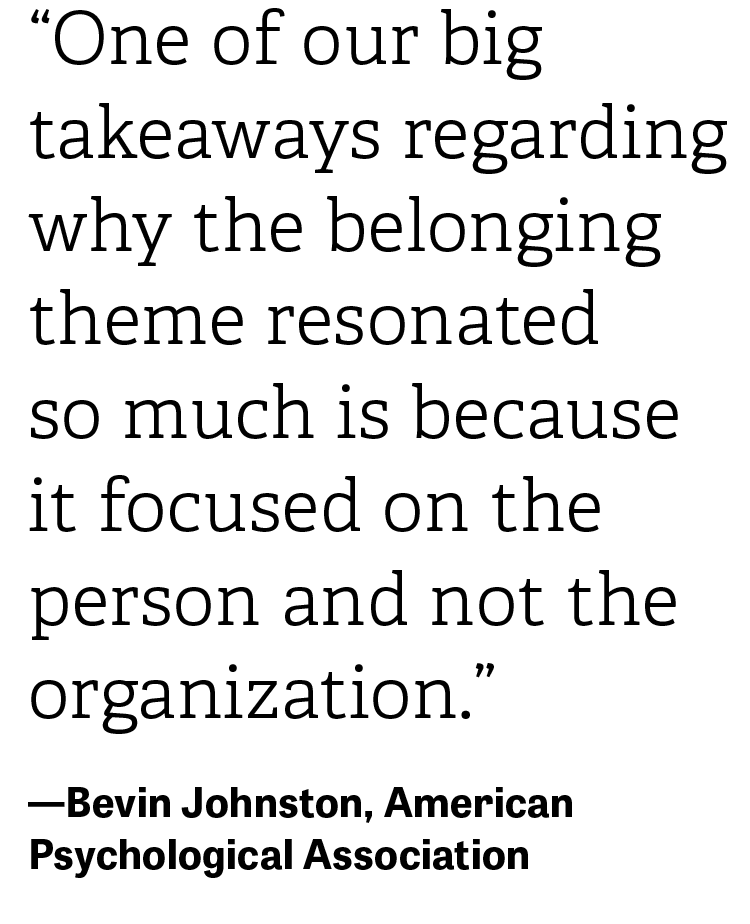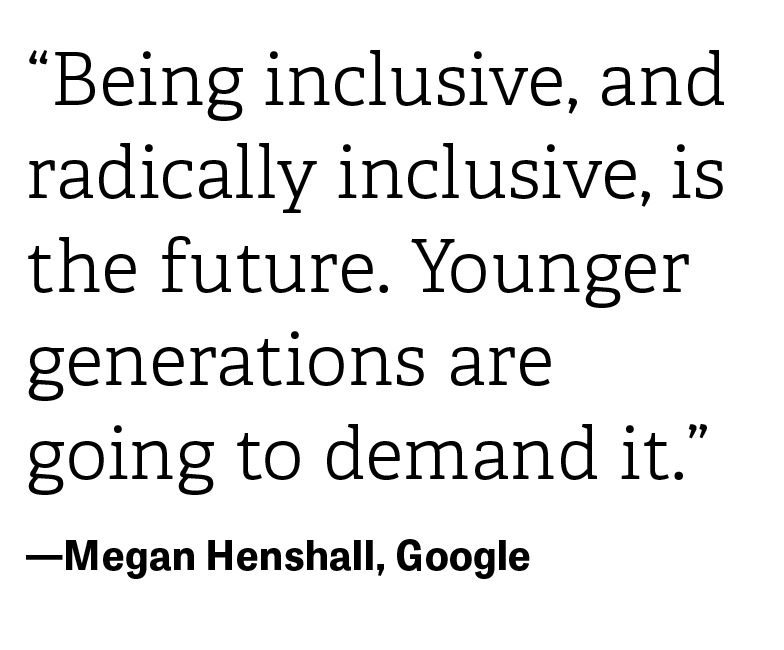“As psychologists, we understand the importance of belonging: a deep sense of connection with people or place. When we belong, we feel seen, heard, valued, understood, and appreciated, and research shows it has positive mental and physical health benefits,” wrote the American Psychological Association’s president, Thema S. Bryant, PhD, in a message to members about the theme of APA 2023, the association’s annual meeting.
“As one who studies and has survived interpersonal trauma and the collective trauma of oppression, I am aware of the significance of belonging. With that in mind, I have made enhancing the sense of belonging at APA a priority. APA 2023’s theme is ‘You belong here.’”
Bryant’s theme reflects the direction where many think meetings are headed. While conference teams often have diversity, equity, and inclusion initiatives in their sights, belonging is the next step forward. It means something beyond making a meeting accessible to all types of people to attend. With belonging, attendees feel comfortable and connected as a result of being accepted and supported.
For organizations that believe conferences are better when they bring together all voices—even those often disinclined to attend group events, such as introverts, people who process information differently, or those who are temporarily or permanently disabled in some way—fostering a sense of belonging is a critical objective.
And the upside of the efforts are clear. While Bryant notes the health benefits of belonging, bottom-line advantages for the host organization are also part of the equation. A telling statistic from a 2019 workplace study by BetterUp reveals that employees who feel a sense of belonging are 167 percent more likely to recommend their company to others as a great place to work. Thought leaders relate that statistic to meetings: Attendees who have a sense of connection and belonging are more likely to return, they say.
What’s a Belonging Day?
Reflecting on the APA 2023 event, which took place from August 3 to 5 in Washington, D.C., Bevin Johnston, senior director, brand and creative at APA, says it was the first time an annual meeting theme “was incredibly well received by attendees. Typically, we don’t hear a lot of feedback on our theme, but this time people not only appreciated it—they felt the theme. From the moment they started hearing from us until the moment they arrived on site, they felt like they belonged.”
Among the highlights of the conference was a designated Belonging Day, when attendees were encouraged to wear clothes or symbols that reflected their backgrounds and identities, such as their sexuality, nationality, or disability. APA also handed out large, white, erasable buttons where attendees could write identifying words or phrases. “They were like badge ribbons on steroids,” Johnson says.
 The event also included “interfaith offerings, a meditation space, and another space for wellness and healing, where some sessions were led by members. Our president even led flash mobs,” Johnson notes. In addition, a main-stage session on what belonging means to the field of psychology took place on Belonging Day.
The event also included “interfaith offerings, a meditation space, and another space for wellness and healing, where some sessions were led by members. Our president even led flash mobs,” Johnson notes. In addition, a main-stage session on what belonging means to the field of psychology took place on Belonging Day.
Johnston, who was both creative director and interim head of meeting planning for APA 2023, says the theme came about due to the president’s passionate beliefs about belonging, but also because of the association CEO’s “One APA” goal, which is to serve all members no matter their background or discipline.
Many APA attendees are therapists and practitioners, but many others are researchers and scientists, says Johnston. So, “we want to make people feel like they need be at the convention because they simply belong there, regardless of their background or career path.” That meant offering as many options as possible to meet the needs of those with varying backgrounds and to experiment more than they had in the past. “There is no one-size-fits-all for a convention of 10,000, so we let people gravitate to what they were interested in. It was more like, ‘find your own adventure.’”
She and her team amped up the amount of information about the conference in pre-con communications. “As soon as someone registered, we had a campaign to give them all the info they could possibly want and more. We stressed that they needed to come into the event with a game plan. It gave us the opportunity to connect the dots for some. The theme helped people see different perspectives in different ways.”
“One of our big takeaways regarding why the belonging theme resonated so much is because it focused on the person and not the organization,” says Johnston. “We really focused on them as opposed to us.” The other reason it was successful, she notes, is because it focused on empathy and authenticity. “If the theme is just about marketing or a varnish with some signs at the event, you might as well do nothing. It’s pointless,” she says. Instead, “bake it into everyone’s reason for being there. That is the reason for coming back. Make it authentic, not just a marketing ploy.”
Why Is Belonging Important Now?
For Megan Henshall, CMP, DES, global events strategic solutions lead at Google, building connections through conferences is urgently needed. A lack of belonging is “a crisis of our time,” she says. “So many cultural and societal problems come from those who don’t feel like they have a tribe. Fixing this crisis of belonging will support a lot of other systemic problems.
“I believe those who gather others for a living have a really important role to play for solving the lack of belonging in the world,” she adds. “We have a tool, and we are the best ones to wield it. As an industry we must get behind it and figure it out. If we do, we will see a lot of positive side effects. Being inclusive, and radically inclusive, is the future. Younger generations are going to demand it.”
One event-industry supplier addressing belonging issues is Encore, which offers solutions for creative design, production, and technology. It, like so many other businesses, has surveyed employees about their needs in the workplace, for career-path and retention reasons. Encore has to meet a set of standards as part of being certified as one of the Great Places to Work, says Amanda Armstrong, CMP, CED, Encore’s senior vice president, communications and industry relations.
“Belonging is one of our strategic pillars as an organization. We felt strongly about adding the ‘B’ to DEIB and realized that what we were doing internally to foster a sense of belonging should extend externally,” she says. “When employees and attendees at a meeting are more engaged, they participate more, which leads to collaboration and, ideally, to innovation.”
Related Content:
• 16 Ways to Increase Belonging at Events
• For a Welcoming Event, Cultural Sensitivity Is Essential
To engage with the concept of belonging, Encore has partnered with the IMEX America show to create an immersive experience in the exhibit hall. The first part is a film cled “Breaking Free,” which challenges meeting professionals to think about designing events from a human perspective, leading to greater inclusion and feelings of belonging. Then, when attendees walk out of the theater, they enter a space where they can write their commitment to the film’s themes on a mirrored wall. The comments Encore received from the October 2023 event were so meaningful that Armstrong had the wall shipped back to Chicago headquarters to be displayed in the employee café.
The Belonging Playbook
Another thought leader who believes in the importance of creating belonging at events is Naomi Clare Crellin, CEO and founder of Storycraft Lab, a consultancy that specializes in experiential engagement. Storycraft and its partners, Valuegraphics and Google Experience Institute (Xi), are developing a Belonging Playbook that will offer practical ideas to create belonging at events; it’s set to launch by second quarter of 2024 as a free website.
 Using the Belonging Playbook, an event planner will plug in the region and industry vertical she is serving, says Crellin. “For example, my attendees are medical professionals from Canada. The Playbook will provide recommendations [for event design that can make networking more meaningful] according to profiles of what makes them feel like they belong. One profile might include ‘I feel like I belong when people recommend me professionally.’”
Using the Belonging Playbook, an event planner will plug in the region and industry vertical she is serving, says Crellin. “For example, my attendees are medical professionals from Canada. The Playbook will provide recommendations [for event design that can make networking more meaningful] according to profiles of what makes them feel like they belong. One profile might include ‘I feel like I belong when people recommend me professionally.’”
The tool is the result of “putting together a big quantitative data set from Valuegraphics and the Wheel of Belonging,” a Storycraft concept, says Crellin.
The Valuegraphics Belonging Index has identified what belonging means to people in different locations and in different industries based on more than 750,000 surveys across 180 countries. Crellin notes that it is important that the Belonging Playbook has a scientific framework so that the meetings industry can get behind it.
The Wheel of Belonging is a Storycraft qualitative resource, derived from industry conversations and surveys about when people experience a sense of belonging.
The Wheel of Belonging came out of a partnership between Storycraft and Google Xi, a group launched in 2021 to examine what events of the future could look like. A white paper based on that collaboration explains four insights about meeting diverse-audience needs: “This journey of discovery led to a domino effect of revelations: First, it revealed a gap in how the industry considered (or rather didn’t consider) neuro-inclusion. Second, it revealed the importance of belonging to both our audiences and the organizations we serve. Third, it demonstrated the role of choice in fostering belonging. Finally, it established that an act of personalization is an act of inclusion, one that will generate a result of beneficial belonging.”
In addition to the Belonging Playbook website, a physical book will be available. Storycraft is working with Meeting Professionals International on ways to reach a global audience of meeting organizers and designers through focus groups.
The idea of belonging at events has taken off in just one year, Crellin says. She and Google’s Henshall led a session about it at IMEX Americas 2022, where “we made an argument for why it is so good for business. It’s amazing how far and deep we’ve come, to see the way event designers embraced the topic in 2023,” she says. “My one fear is that it might falter and be seen as a ‘performative marketing’ message. That’s why we need to ensure there are practical applications [suggested by the Playbook]. We want to hear about case studies where the framework is being used.”





